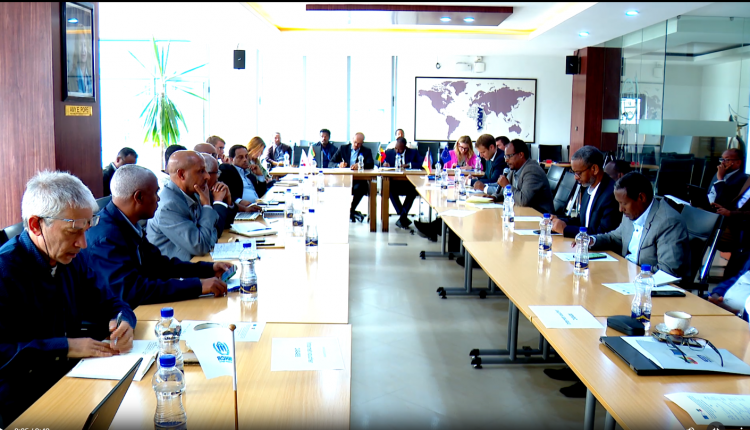Dev’t partners urged to promote self-sufficiency in IDP support, says EDRMC
Addis Ababa, June 12, 2025 (FMC) – Ethiopian Disaster Risk Management Deputy Commissioner Nesibu Yasin emphasized the need for development partners’ initiatives to strengthen the capacity of local communities to become independent and self-reliant.
Speaking at the second Programme Steering Committee (PSC) meeting of the initiative titled “Sustainable Assistance for Individuals Displaced by Conflict and Natural Disasters, and Their Supporting Communities in Afar, Amhara, Benishangul-Gumuz, and Tigray,” Nesibu highlighted that fostering self-sufficiency is essential for achieving sustainable outcomes that can withstand future crises and enhance community resilience.
The Deputy Commissioner called on development partners to intensify collaboration focused on improving the living conditions of internally displaced persons (IDPs) by addressing their specific needs. Participants in the meeting included representatives from the Ethiopian Disaster Risk Management Commission, the Ministry of Labour and Skills, the European Union, the Government of Germany, as well as international organizations such as the International Organization for Migration (IOM) and the United Nations High Commissioner for Refugees (UNHCR).
Nesibu underscored the critical importance of building local capacities in sectors like health, education, and infrastructure to promote long-term independence. He also stressed that establishing a comprehensive National ID registry for IDPs is vital for efficient resource management and targeted assistance.
Labour and Skills State Minister Solomon Soka praised the psychosocial support services provided to IDPs, describing them as a best practice that should be expanded to reach more beneficiaries. He further emphasized the Ethiopian government’s priority to empower IDPs by building their capacities and fostering financial independence.
IOM-UN Migration Project Coordinator Nadia Zaiter noted that the organization is collaborating closely with federal and regional partners throughout the project’s implementation phase. The initiative supports IDPs and host communities by focusing on livelihoods, protection, and water, sanitation, and hygiene (WASH) services to promote social cohesion.
During the meeting, partners reviewed achievements from the project’s first year, including vocational training provided to over 1,600 individuals and financial support enabling 250 people to start businesses. Additionally, the project improved WASH infrastructure by constructing more than 15 water supply facilities and launched hygiene promotion campaigns.
Progress was also made in protection and social inclusion through the establishment of inclusive community centers and targeted training addressing issues such as gender-based violence. Over 30,000 IDPs have been registered in the national identification system to date.
Appreciating the three-year initiative’s work in WASH and other sectors, partners highlighted the importance of empowering communities to move beyond reliance on aid and toward sustainable development, a report by local newswire service ENA noted.
Looking ahead, the project aims to expand vocational training, enhance WASH services, and continue its protection efforts. The meeting concluded with a shared commitment to delivering lasting solutions for displaced individuals and their host communities.

